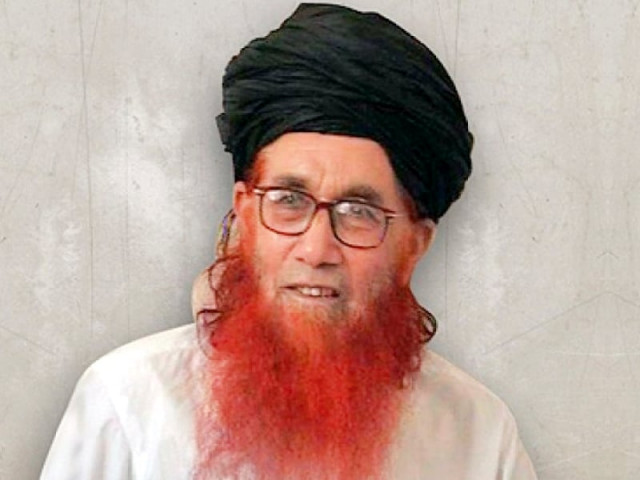Sufi Muhammad’s trial: ATC reserves judgment on transfer of sedition cases
Defence lawyer argues ATC has no jurisdiction over cases.

Maulana Sufi Muhammad. PHOTO: FILE
The hearing of two sedition cases against the cleric was held on Saturday inside Central Prison Peshawar where he is incarcerated for the past several years. Maulana Sufi Muhammad is accused of delivering anti-state speeches in Timergara, Lower Dir in 2009 and Grassy Ground, Swat.
The cleric’s counsel Adil Majeed filed a fresh application seeking the transfer of the cases to a regular court from the ATC. Raising reservations over the hearings on Saturday, Majeed said the ATC does not have the jurisdiction to hear the sedition cases against Sufi Muhammad. According to Majeed, the sections imposed in the FIR do not fall in the ATC’s ambit.
However, the state prosecutor opposed the defence attorney’s arguments, stating that the said cases can be heard in the ATC.
Moreover, the court impleaded (included) Sufi Muhammad’s son Hayatullah in the Grassy Ground sedition case. The cleric’s two other sons, Ziaullah and Rizwanullah, are already named in the case and have obtained bail from the court. The three men are accused of joining the rally in which Sufi Muhammad allegedly termed the government of the time ‘un-Islamic.’
Subsequently, Judge Abdur Rauf Khan reserved his judgment on the point whether the ATC can hear the sedition cases or not, and decided he will deliver his verdict on April 18 in the cases.
Case history
The cleric was detained by security forces during the Swat military operation. A total of 13 cases were registered against him for murder, treason, arson and sedition, of which he has been acquitted in 10.
On February 7, Sufi Muhammad was indicted in a sedition case by an ATC and charges were framed against him for delivering an anti-government speech at Rest House Ground Timergara in 2009.
He had been booked under sections 153-A of the Pakistan Penal Code and 11-F3 of the Anti-Terrorism Act (ATA). PPC’s Section 153-A deals with promoting enmity between different groups, creating disharmony, hatred and ill will among different religious, racial, lingual or regional groups, castes or communities, while ATA’s Section 11-F3 deals with the meeting or gathering of a proscribed organisation.
Sufi Muhammad is the father-in-law of banned Tehreek-e-Taliban Pakistan (TTP) chief Mullah Fazlullah and belongs to Dir.
Published in The Express Tribune, April 5th, 2015.













COMMENTS
Comments are moderated and generally will be posted if they are on-topic and not abusive.
For more information, please see our Comments FAQ